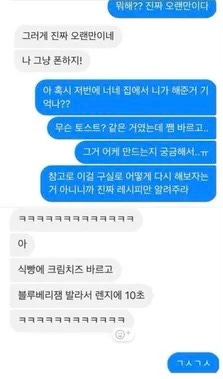안녕! It’s Ari, your chatty Korean friend and weekend reminder. 🎉 Today’s newsletter covers a toast recipe and how to text “thank you” in Korean. Let’s dive in!
Ex-Boyfriend Toast
Several years ago, a South Korean girl wrote a post about a toast she just couldn’t forget. It was a toast her ex-boyfriend used to make for her when they were together. Eventually, the craving got to her, and she ended up reaching out to her ex to ask for the recipe. 😱 She shared their awkward chat exchange online, and it quickly went viral. (I’ll share part of their conversation later in a mini Korean lesson—it’s hilarious.)
And the toast, dubbed as “전남친 토스트 (Ex-Boyfriend Toast)” became a massive hit. It got so popular that even GS25, the biggest convenience store chain in South Korea, released a similar sandwich called the “Boyfriend Sandwich.”
But like most viral things online, the buzz eventually died down and was forgotten—until recently. The toast made an unexpected comeback after appearing on a popular TV show, and it went viral all over again.
It was also revealed that a café in Brooklyn, New York sells a menu item with the exact same name: Ex-Boyfriend Toast. 👆 It looks like this little food story traveled far.
If you’re curious to try “the toast that lingers longer than your ex,” check out the recipe below. It’s super simple—and who knows, it might even bring back some memories of your own ex. 💭
How to Make the Ex-Boyfriend Toast
Toast two slices of white bread in a toaster.
Spread a generous layer of St. Dalfour blueberry jam on one slice, and Madame Loik cream cheese on the other.
(These are the original brands mentioned in the chat, but feel free to use your favorite blueberry jam and cream cheese.)Press the two slices together to make a sandwich.
Microwave the whole thing for 10 seconds—just enough to warm it slightly and bring everything together. Bon appétit! 😋
Mini Korean Lesson: Thank You, Ex 💔
As promised, here’s the conversation between the girl who couldn’t forget her ex-boyfriend’s toast and her ex. Since the original image is low quality, 👆 I’m sharing a transcript of part of their exchange below. Check it out!
Girl:
뭐해?? 진짜 오랜만이다 (What are you doing?? It’s really been a long time)
Boy:
그러게 진짜 오랜만이네 (Yeah, it really has been a while)
나 그냥 폰하지! (I was just on my phone!)
Girl:
아 혹시 저번에 너네 집에서 니가 해줬던 거 기억나??
(Do you remember that thing you made for me at your place back then??)
무슨 토스트? 같은 거였는데 잼 바르고…
(Some kind of toast? with jam on it…)
그거 어떻게 만드는지 궁금해서…
(I was wondering how to make it…)
참고로 이걸 구실로 어떻게 다시 해보자는 거 아니니까 진짜 레시피만 알려주라
(Just so you know, I’m not using this as an excuse to get back together or anything—just tell me the recipe.)
After a lot of awkward ㅋㅋㅋ (the Korean equivalent of “lol” or laughing), he shared the recipe. Then, at the end, she expressed her gratitude with the casual expression we’re going to learn today!
“ㄱㅅㄱㅅ”
“ㄱㅅ” is a consonant-only abbreviation of “감사(하다),” which means “thanks.” Koreans often repeat it as “ㄱㅅㄱㅅ” for a friendly, informal tone. It’s commonly used in text messages between friends or online comments.
ㄱㅅㄱㅅ for reading! 🥰 Originally, I wrote a news article for this week, but at the last minute, I didn’t feel good about it 😓—so I decided to keep things simple and just share the toast recipe and the Korean lesson. Hopefully, I’ll be back with a full newsletter next time!
If you’d like to support my work, consider grabbing my book, I Like You, but Not Your iPhone! 📕 Or buying me a coffee ☕️ 안녕!






hehe whether you update us on news in korea or not your posts are always a delight! thanks for sharing ^^ now I gotta go grab some blueberry jam because this sounds delicious, and anything tastes great when cream cheese is involved!
ㄱ ㅅ ㄱ ㅅ for such an entertaining post! I will by trying this Ex-Boyfriend Toast out soon, I think! I don't know how I never thought to put those two things together, but I expect my wife and I will both love it!
What is the verb you use in Korean to cook something in the microwave? We commonly use "nuke" or "zap" or "cook" or even as you said in your post, "microwave." What are the most common verbs in Korean to describe that action? In the text exchange, it doesn't look like the ex-boyfriend even used a verb.